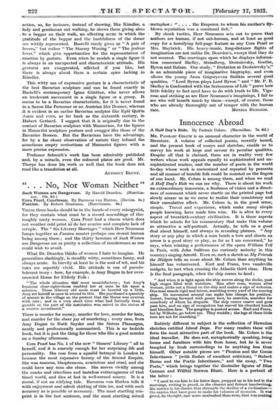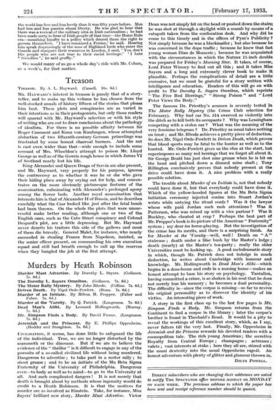Innocence Abroad
A Half Day's Ride. By Padraie Colinn. (Macmillan. 7s. tid.) Mn. PAIVRAIC COLI:The is an unusual character in the world of literature. A volume of collected poems, recently issued, and the present book of essays and sketches, enable us to 'survey his work at large and savour its peculiar qualities. Despite all that is claimed, there are in reality very few writers whose work appeals equally to sophisticated and un- sophisticated readers, and the number of poets in the world to-day whose work is memorized and repeated by peasants and all manner of humble folk could be counted on the fingers of one hand. Mr. eotum is among them, and when we read A Ralf Day's Ride we can see why. There is about his work an extraordinary innocence, a freshness of vision and a direct- ness of comment which never startle on the printed page but Slowly amaze us as we come to realize their consistency and their cumulative effect. Mr. Colum is, in the good sense, simple. Travel and experience, which make many simple people knowing, have made him wise. Be is alive to every aspect of twentieth-century civilization. It is those aspects which he selects for his commentary that make this volume so attractive a self-portrait. Actually, he tells us a good -deal about himself, and always in revealing ' phrases. "Any story or any play in which a man bends a bow and shoots an arrow is a good story or play, as far as I am concerned," he says, when relating a performance of the opera William Tell in Paris, with John Sullivan (so curiously unlucky in this country) singing Arnold. Even so, such a sketch-as My Friends the Midgets tells us more about Mr. Colum than anything he himself has volunteered. Karl and Franz, two vaudeville midgets, he met when crossing the Atlantic third class. Hera is the final paragraph, when the ship comes to land : " And when it is light again the ship moves along the docks, past high stages filled with watchers: Man after man, woman after Woman, pelts out a friend on the ship and makes a sign of welcome. -Daemon stands rigid arid intent, searching every yard of the nearing ahip. No movement around can make him change his position: Intent, leaning forward with gaunt face, he searches, searches for somebody of whom he despairs. The ship comes nearer and goes past him, and no sign of recognition haa moved his clenched hands and bloodless face. The gangway is pushed across. Karl and Franz, led by Wilhelm, go before me. They waddle ; the legs of these little men are not for marching."
Entirely different in subject is the collection of Hawaiian sketches entitled Islam.! Days. For many readers these will form the most attractive part of the book. Mr. Colum is the ideal traveller. Re does not, metaphorically speaking, bring house and furniture with him from home, but he is never tempted by fresh surroundings to be anything less than himself. Other notable pieces are "Plautus and the Comb, Inheritance "(with flashes of excellent criticism), "Robert Burns and the Poetic Inheritance," and the essay, "Two Poets," which brings together the dissimilar figures of Bliss Carman and Wilfrid Scawen Blunt. Here is a portrait of
the latter :
" I used tease him in his latter days, propped up in his bed in the mornings, writing in pencil, in the-clearest and firmest handwriting, the entries in his diaries that chronicle the decline of a civilization— the entries that have gone to make his volumes of memoirs. It wad greed, he thought, now mere unabashed than ever, that was making the world leas free and less lovely than it was fifty years before. Men had leas and leas passion about liberty. He was glad to hear that there was a revival of the military idea in Irish nationalism ; he had been made sorry to hear of Irish people of that time—the Home Rule era—mouthing loyalty to a policy which denied them the right to govern themselves. I have remained a Fenian' ' he said. Hearing him speak dispraisingly of the sons of Highland lords who enter the Guards and dissipate their resources in London, I said, 'You don't' like people who are not true to their racial heritage.' 'I hate t friendlies ",' he said gruffly."
We would many of us go a whole day's ride with Mr. Colum, or a week's, for that matter.







































 Previous page
Previous page